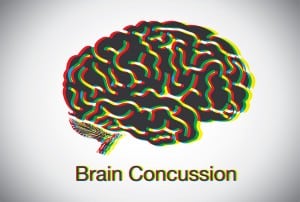IS A CONCUSSION A TRAUMATIC BRAIN INJURY?
September 26, 2016
The American Association of Neurological Surgeons defines concussion as an injury to the brain that results in temporary loss of normal brain function.[2] “The formal medical definition of concussion is a clinical syndrome characterized by immediate and transient alteration in brain function, including alteration of mental status and level of consciousness, resulting from mechanical force or trauma.”[3]
The American Congress of Rehabilitation Medicine defines a patient with mild traumatic brain injury as a person who has had a traumatically induced physiological disruption of brain function, as manifested by at least one of the following:
- Any period of loss of consciousness;
- Any loss of memory for events immediately before or after the accident;
- Any alteration in mental state at the time of the accident (eg, feeling dazed, disoriented, or confused); and
- Focal neurological deficit(s) that may or may not be transient; but where the severity of the injury does not exceed the following:
- Loss of consciousness of approximately 30 minutes or less;
- After 30 minutes, an initial Glasgow Coma Scale (GCS) of 13–15; and
- Posttraumatic amnesia (PTA) not greater than 24 hours.”
Both terms imply that the injured person can suffer a disruption of the brain function as a result of a mechanical force or trauma. However, what differentiates a concussion from a mild brain injury is that the consequences of a concussion are temporary and/or transient, while the consequences of a mild traumatic brain injury may not be so.
For this reason, a concussion is a type of mild injury where the injured person will experience an alteration of the brain as well as an alteration of mental status (e.g. loss of consciousness). In addition, the injured person may experience some of the symptoms associated with a mild brain injury, but those consequences will disappear and the injured person will reach full recovery as long as the patients stick to the treatment, which is mainly rest. Persons with a concussion should be mindful, though, of the second-impact syndrome where if a person hasn’t reached full recovery from a previous concussion and a second concussion is sustained, an often fatal brain swelling can occur.
Just as a concussion, the symptoms and consequences associated with a mild traumatic brain injury will go away after a short time in 85% of the cases. However, there are reports of a “Miserable Minority,” where patients develop long-term, life-changing, and devastating symptoms. This type of scenarios is what distinguish a concussion from a mild traumatic brain injury, and which evidence the need for any type of head injury to be diagnosed properly to exclude the possibility as to whether the injured person could have suffered a concussion or a mild traumatic injury. Proper injury labeling in this cases is crucial so that proper diagnosis, treatment, and recovery can be given to the patient.
The attorneys at the Amaro Law Firm know the importance of an injured person’s proper diagnosis and treatment as part of their recovery process. That is the reason we have written this blog. If you or a loved one has suffered a head injury and suspect that such injury may have led to either a concussion or a brain injury, contact us so that we can evaluate your case and guide you into the right direction. Our attorneys have vast experience dealing with TBI-related cases, and will provide aggressive representation in the event your injury was caused by somebody else’s negligence.
[1] https://www.momsteam.com/health-safety/concussion-label-sends-wrong-message-use-MTBI-mild-traumatic-brain-injury-instead
[2] https://www.aans.org/patient%20information/conditions%20and%20treatments/concussion.aspx
[3] Id.
